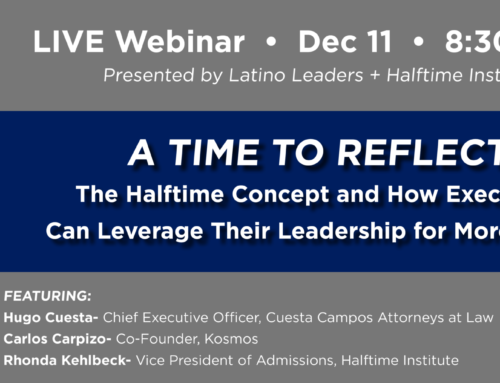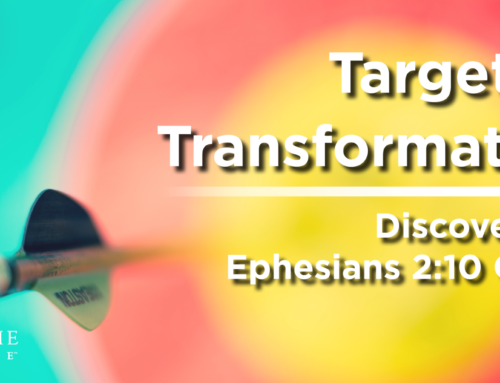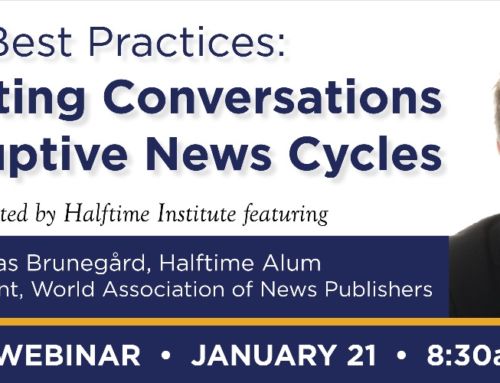
We are so grateful for the sacrifice and bravery of those who have served and continue to serve in the United States Armed Forces. In honor of Veterans Day, we are featuring the story of Halftime Alum, Major General Chris McPadden.
At the end of a successful military career, Major General Chris McPadden knew that he wanted to navigate his transition to civilian life prayerfully and carefully. After 35 years of service, Chris was faced with a multitude of options in various sectors but wanted to avoid “rushing to wrong” or “defaulting to easy” in the decision-making process for the next season.
This is where Halftime came into the picture.
Chris read through the book Halftime by Bob Buford on a trip overseas and the content resonated with the fork-in-the-road life stage he was entering. The reference to the Halftime Institute on the book cover led to a conversation with Rhonda and eventually to enrollment in the Halftime Fellows Program where Chris was able to process and prepare for his future impact within a Cohort of like-minded peers.
Today, Chris and his wife are living in NYC, where he has re-purposed his passion and experience to meet a need in a new season of impact. His mission for this season of impact is directly aligned with his purpose and allows him to lead and serve within an organization as a result of a friendship he developed with a Fellow Cohort member… but more on that to come!
Recently, we caught up with Chris and he shared three applicable ideas for strategically navigating transition. Keep reading to gain from his insightful suggestions!
Three Tips for Strategically Navigating Transition
1. Use Every Tool in the Toolbox
All strategic planning frameworks are comprised of a few key ingredients for success. At Halftime the key ingredients include coaching, Cohort conversations, staff support, and a toolbox of resources from books and alumni webinars to interactive exercises including a roadmap to plan and track progress.
I found that every tool was useful and brought value to the journey.
Having worked in a strategic planning role for over a decade at the highest levels of our military, I have yet to take part in a process that enabled a diverse group of newcomers to develop individual, coherent life plans in 48 hours the way Halftime did for our entire Cohort.
I would encourage those who may be where I was to trust the process and utilize the proven tools.
2. Study the Obstacle Course
The Indoor Obstacle Course Test at West Point requires careful study and practice before completion. This timed and intense course can only be done successfully if you know the techniques. Before being tested, the Department of Physical Education Faculty walk you through each obstacle of the course, one at a time. All of the obstacles are navigable, but they require careful study and practice to master.
The same is true in your halftime season. The Fellows Program gave me clarity by concretely addressing the seemingly most challenging and ambiguous issues (obstacles) of: purpose, calling, mission, passion, experience and strengths. The process enabled me to put the various elements into a coherent, actionable, flexible and balanced plan – a road map.
Through prayer, wise counsel, and time spent studying the techniques, I have been able to develop personal understanding and applicable answers to life’s most challenging and ambiguous issues within the context of success, significance and surrender in ways that are practical, pragmatic and executable.
I would encourage teammates to engage, study, learn, and determine your own answers to these life issues and take them on directly. Take the time to study the course and learn the most effective techniques for navigation. In a sense, one cannot navigate the obstacle course successfully any other way.
3. Don’t Go It Alone
In addition to family and the Lord, I’ve included my coach, Cohort, friends, and Halftime alumni on my journey.
For our Cohort, I would say that we are about as close as we possibly could be outside of an actual family. I anticipate these will be friends for a lifetime and I know that if I called on any member of my Cohort at any time, they would be there for me without question.
Conversations with others in the Halftime Network and beyond have also been of great value. I was encouraged to be proactive and meet with as many people as I could to seek guidance and gain insight on my next season. Through conducting a multitude of informal interviews and taking notes along the way, I was able to gain clarity on what would and wouldn’t be a great fit. I simply met with as many people as I could, asking them if they had any guidance or advice and if there was anyone else with whom I should connect. The amount of wisdom I obtained from these many engagements was invaluable. Proverbs 19:20 says, “Get all the advice and instruction you can so you will be wise the rest of your life.” That is what informal interviews provide for those who conduct them.
These “low cost probe” conversations proved to be a low-risk but extremely high-reward component of my halftime journey.
So, what was waiting on the other side of Chris’s transition? Keep reading to hear more of his story:
As I was navigating my own transition, I struggled with the idea that nothing seemed to fit.
I had a list of criteria that was important to me and spent time in prayer wrestling through the fact that nothing was clicking. The very next day a Cohort member called me, inviting me to fly out to NYC and speak on strategic planning to a financial firm and foundation. Just before the trip, I happened to work through an exercise on Finding Your Purpose by Reggie Campbell.
During my visit, my cohort member and I ended up having a two-hour discussion together with the Co-CEO of the organization who asked me what I thought my personal mission was. At that point my statement was so new that I had only shared it with my wife, but I was able to explain that my purpose is to glorify God by loving and serving others and integrating efforts for His sake and the Good News. I thought he may think I was pretty out there, but instead he understood exactly where I was coming from. He responded by saying, “I totally get that.”
Before I went out to speak to the firm, my Cohort member asked the Co-CEO if he wanted to tell me anything prior to my presentation. Expecting to receive some speaking tips, I instead found out that they wanted me to be a part of the team. By the end of the day, I had an informal offer to become a Senior Advisor and Co-President to the Foundation which is exactly what ended up happening. My wife and I accepted the offer and a few days later had a contract to rent an apartment in mid-town NYC, two blocks from where I work.
Today, I am part of Archegos Capital Management, an organization committed to developing Kingdom minded capitalists, and its associated Grace and Mercy Foundation which supports the poor and oppressed, and helps people learn, grow, and serve.
The Foundation donates millions of dollars annually to ~80 organizations around the globe, most of which are Christian based. We also help others learn and grow professionally, personally, and spiritually through initiatives including Public Reading of Scripture Gatherings and Just Show Up Book Clubs.
Because of my halftime journey, I am able to clearly see how the experience I gained over the course of my military career paved the way for a new season of impact. As I mentioned, my Cohort was full of incredibly diverse leaders across all backgrounds. But our common passion to support, encourage and love one another and leverage our leadership experience for impact bonded us more strongly than I could’ve imagined.
I would especially encourage any and every military leader to seek out this program. Just because you’ve done something for a long time, doesn’t mean it’s the only thing you can do. The obstacles can be intimidating and will take time, but now is the time to start with a clean slate and explore the options. Transition can be very unsettling, and military guys don’t necessarily have the hard wiring to be unsettled, but transition can be navigated in a strategic and effective way.
Are you in a season of transition?
Consider getting connected with a Halftime Certified Coach or Cohort for more clarity, joy, and impact in the season ahead. Learn more below.





